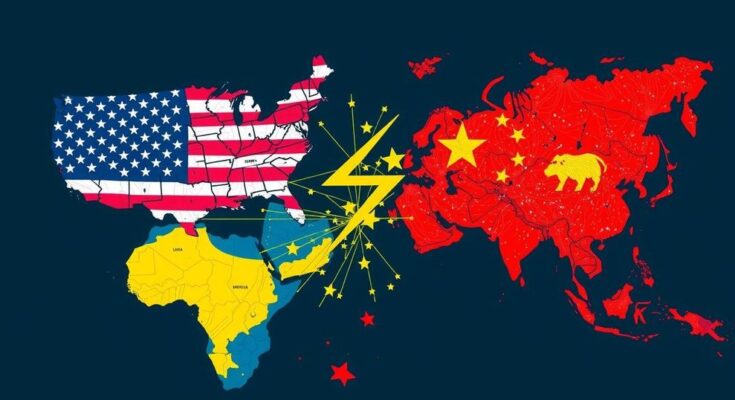President-elect Donald Trump has threatened to impose a 100% tariff on BRICS nations if they attempt to replace the U.S. dollar as the world’s primary reserve currency. The BRICS countries, seeking economic independence, face significant challenges in creating a competing currency. Critics warn that such tariffs could harm U.S. consumers and undermine the dollar’s global stature.
President-elect Donald Trump has threatened to impose a 100% tariff on the BRICS nations, which include Brazil, Russia, India, China, South Africa, Egypt, Ethiopia, Iran, and the United Arab Emirates. This decision stems from concerns that these countries may attempt to replace the U.S. dollar as the world’s primary reserve currency. Trump stated that if the BRICS nations create or support an alternative currency, they would face significant economic consequences, alienating them from the lucrative U.S. market. This threat aligns with Trump’s broader tariffs initiatives targeting Canada, Mexico, and China, aimed at incentivizing those nations to address issues related to unauthorized migration and drug trade.
The BRICS nations have sought to reduce their reliance on the U.S. dollar since the group’s formation in 2009, primarily to bolster their economic independence. Russian President Vladimir Putin has previously advocated for the establishment of a new international payment system, asserting that “the dollar is being used as a weapon.” Moreover, Brazilian President Luiz Inácio Lula da Silva has proposed a common South American currency to lessen the region’s dependence on the dollar.
While some critics of Trump’s tariffs argue that they could harm the U.S. economy by raising consumer prices on imported goods, experts emphasize the practical challenges that BRICS countries would face in establishing a competing currency. The dollar remains the predominant global reserve currency, comprising approximately 58% of all foreign exchange reserves. Furthermore, critical trade commodities continue to be priced and traded predominantly in dollars, suggesting that an emergent BRICS currency would struggle to attract global confidence.
South Africa’s government has distanced itself from any narrative suggesting a BRICS currency is imminent, stating that discussions within the group focus on trading using individual national currencies rather than pursuing a collective currency initiative. Economists warn that the proposed tariffs could exacerbate inflationary pressures in the U.S., ultimately burdening consumers with higher prices for essential goods, including coffee, electronics, and clothing sourced from BRICS countries.
Critics have articulated concerns about the broader geopolitical implications of Trump’s tariff threats. Experts believe that such moves may diminish the perceived strength of the dollar and could potentially accelerate other nations’ shifts away from using it as a reserve currency. By creating an impression that adherence to the dollar is a unilateral favor to the U.S., Trump’s tactics may inadvertently undermine the dollar’s global status and its role as a standard for international trade.
The BRICS coalition, initially composed of Brazil, Russia, India, China, and South Africa, was established in 2009 to advance the economic interests of emerging markets and decrease dependency on the U.S. dollar. The group has recently gained interest in creating an alternative currency to counter the dollar’s dominance in international trade. Additionally, the dollar’s preeminence provides the United States with key advantages, such as low borrowing costs and significant leverage in global economic matters. Recent discussions within BRICS reflect a desire to strengthen regional currencies and trade practices while reducing reliance on the dollar.
In summary, Trump’s threats to impose tariffs on BRICS nations highlight tensions surrounding the U.S. dollar’s position as the world’s primary reserve currency. While the initiative reflects economic and geopolitical strategies, experts caution that implementing such tariffs could create retaliatory measures, strain international relations, and negatively impact U.S. consumers. The pathway toward establishing a BRICS currency remains complex and fraught with challenges, complicating the prospect of any genuine competition against the dollar in the near term.
Original Source: www.cbsnews.com




